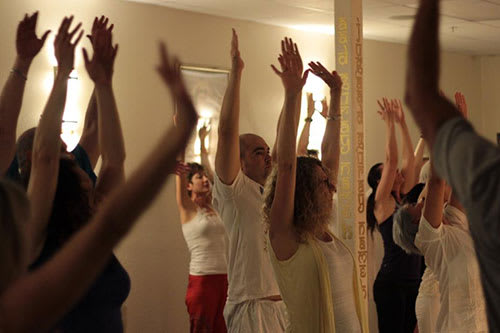Benefits of Yoga and Meditation
The overall benefits of yoga and meditation have become recognizable among the scientific, medical, and main stream communities. There is an ever growing interest in studying the positive effects of these ancient practices simple because of the overwhelming positive response from countless practitioners’ direct experiences. In addition, these positive effects appear to provide overall health benefits regardless of age, background, and gender, level of health or physical condition.
Kundalini Yoga and Meditation is doing more than keeping people flexible, in good health, and in a positive state of mind. This practice is being recommended and used as an alternative and/or supplement in treating a wide range of mental and physical afflictions. Because Kundalini Yoga and Meditation is rooted in the body-mind-spirit connection, it isn’t any wonder why it is having so much success in alleviated a wide range of conditions from: addiction and substance abuse, phobias and stress, mental disorders (OCD, PTSD, Generalized Anxiety), back and joint pain, muscle tension and stiffness, digestive problems, and the list goes on.
In addition, this practice is being used in the field of pain management and cancer recovery for its ability to control pain and speed up the natural healing process by reducing stress on the mind and body. The positive effects of Kundalini Yoga and Meditation simply aids in an overall sense of well being. It also provides all the benefits of a physical fitness routine which includes muscle and cardiovascular health, joint health, increased metabolism, weight loss, healthy digestion, increased circulation, and much more.
The practice of Kundalini Yoga and Meditation balances the glandular system, strengthens the nervous system, and enables us to harness the energy of the mind that generates emotion. This allows us to be in control of ourselves, rather than being controlled by our thoughts and feelings. This technology combines breath, mudra, eye-focus, mantra, body locks, and postures in a precise and conscious manner to influence the body, mind, and soul.
Kundalini Yoga and Meditation is for anyone and everyone interested in personal improvement and growth. It is for anyone who has to cope with the challenges and stresses of holding a job, raising a family, managing businesses, and maintaining a home. Kundalini Yoga and Meditation provides you with the necessary skills to cope successfully with the challenges of daily living. Here are just some of the benefits of Kundalini Yoga and Meditation.
Allow yourself the opportunity to experience for yourself these real and powerful benefits.

- Improves digestion and Increases circulation
- Increases energy level and lung capacity for better breathing
- More strength, energy, fitness & vitality
- Reduces stress and strengthens the immune and nervous system
- Balances Emotions and brings clarity to the mind
- Encourages sense of peace and greater clarity of thought
- Greater awareness of one`s true Divine nature
- More spontaneous flow of joy & happiness
- Orients consciousness to create happiness and health
- Supports and encourages personal transformation and growth
“Meditation is the process of bringing you back to the real you.”
A stressor is any stimuli that create stress on the body. Ultimately, these triggers cause an internal response that affects the mind and body. Whether you are worried about an upcoming interview, experiencing chronic pain or suffering from any form of anxiety, stress can reduce your ability to cope, recover, and maintain a healthy and happy lifestyle.
Yoga and meditation has shown through medical research to help control and reduce pain. It also improves emotional and mental responses to stressors, which in turn reduces the negative physiological responses of the body which, over time, cause illness and disease, or delay in any recovery. Learn More
Makiko Kitamura, a health and science journalist for Bloomberg news, recently wrote in his online article, Harvard Yoga Scientists Find Proof of Meditation Benefits, that “scientists are getting close to proving what yogis have held to be true for centuries – yoga and meditation can ward off stress and disease” (2013, para. 1).
According to the article, a five year study has been underway by Harvard Medical School psychiatrist John Denninger on how the ancient practices and techniques of yoga, “affect genes and brain activity in the chronically stressed. His latest work follows a study he and others published earlier this year showing how so-called mind-body techniques can switch on and off some genes linked to stress and immune function” (Kitamura, 2013, para. 2).
Kitamura quoted Denninger stating “there is a true biological effect” and “The kinds of things that happen when you meditate do have effects throughout the body, not just in the brain” (2013, para. 4). Kitamura reports that, “unlike early studies, this one is the first to focus on participants with high levels of stress” (2013, para. 13).
The report also describes Denniger’s recent 3.3 million dollar study, funded by the Nation Institutes of Health, where “210 relatively healthy subjects with high levels of reported choric stress for six months” participate in 3 groups.
One group with 70 participants perform a form of yoga known as Kundalini, another 70 meditate and the rest listen to stress education audiobooks, all for 20 minutes a day at home. Kundalini is a form of yoga that incorporates meditation, breathing exercises and the singing of mantras in addition to postures. Denninger said it was chosen for the study because of its strong meditation component. (Kitamura, 2013, para. 11)
The study published in May in the medical journal PloS One showed that one session of relaxation-response practice was enough to enhance the expression of genes involved in energy metabolism and insulin secretion and reduce expression of genes linked to inflammatory response and stress. (Kitamura, 2013, para. 13)
Yoga and Meditation can Reduce Stress and Anxiety
Catherine Winters & J.D. King- Problem Solved! Anxiety- Prevention,
Hour-long yoga sessions three times a week improved people’s moods and anxiety levels after 12 weeks in one study. The level of GABA (gamma-aminobutyric acid), an amino acid in the brain, is lower in people who report anxiety. Among study participants who took a yoga class, GABA levels increased and reports of anxiety decreased after the session. Yoga’s deep breathing “stimulates the parasympathetic nervous system, which is associated with the ability to relax,” says Chris C. Streeter, MD, an associate professor at Boston University School of Medicine.
In anxious people, ‘we see a deactivation in areas of the brain that govern thought,’ so worries can spiral out of control, says Fadel Zeidan, PhD, a research fellow at Wake Forest School of Medicine. Mindfulness meditation helps you stop the cycle of worry. In Dr. Zeidan’s study, anxiety levels of meditators eased by up to 39%. (Winters & King, 2013, p. 62-66)
Yoga and Meditation can Reduce Depression.
Cary Barbor- The Science of Meditation- Psychology Today
Recent research indicates that meditating brings about dramatic effects in as little as a 10- minute session; several studies have demonstrated that subjects who meditated for a short period of time showed increased alpha waves (the relaxed brain waves) and decreased anxiety and depression.
…Researches at Harvard Medical School used MRI technology on participants to monitor brain activity while they meditated. They found that it activates the sections of the brain in charge of the autonomic nervous system, which governs the functions in our bodies that we can’t control, such as digestion and blood pressure. These are also the functions that are often compromised by stress. (Barbor, 2001, p. 54-59. 5p)
Yoga and Meditation can Aid in Pain Management and IBS symptoms
Christina Boufis- Escape from Pain- Natural Health
In a groundbreaking 2005 study, subjects watched their own fMRI brain scans and experienced how peaceful thoughts caused the pain centers of the brain to calm down. ‘It’s like turning down the amplifier on a stereo,’ says Sean Mackey, M.D., Ph.D., chief of the division of pain management at Stanford University. ‘The input is the same, but your experience of pain is turned down.’
Ronald Glick, M.D., medical director at the Center for Integrative Medicine at the University of Pittsburgh Medical Center, agrees. ‘Pain is part of our fight-or-flight response, and mind-body approaches like paced breathing — which is commonly used during childbirth — slows down the heart, lowers blood pressure, and relaxes the response to pain.’ (Boufis, 2009, p. 50-61. 7p)
Catherine Winters- On The Healing Edge- Prevention
Meditation a Path to Pain-Free Living
Some 116 million Americans suffer from chronic pain, and millions more live with the debilitating symptoms of irritable bowel syndrome. Traditional treatments bring too few lasting results. But two studies point to a surprising new path to relief: the practice of mindfulness meditation.
Mindfulness meditation operates on a simple principle. “You focus on being in the present, not on your worries,” says Susan A. Gaylord, PhD, director of the Mindfulness-Based Stress and Pain Management Program at the University of North Carolina at Chapel Hill, who led the IBS study, which was published in the American Journal of Gastroenterology. When the women she studied applied mindfulness meditation to the diet and lifestyle strategies they were already using to control their IBS, the severity of their symptoms was slashed by 26%.
In a recent study published in the Journal of Neuroscience, mindfulness meditation had equally dramatic effects on reducing pain. Researchers at Wake Forest School of Medicine found that it cut pain intensity by 40%–in some people, by up to 70%!–compared with about 25% for morphine and other pain relievers. “I was surprised by the dramatic results,” says study leader Fadel Zeidan, PhD. (Winters, 2011, p. 88-95, 5p)
Yoga and Meditation is Good For the Heart
Yoga Heart-Healthy Poses
Yoga may decrease sudden surges in the autonomic nervous system, which controls heart rate, respiration, and other functions, preventing A-fib triggers. “While we don’t know enough yet to suggest that yoga replace medication, it’s a good complementary treatment,” says Dr. Lakkireddy. (Winters, 2011, 88-95, 5p)
Yoga and Meditation can Aid in Cancer Recovery
Karyn-Hede- Supportive Care: Large Studies Ease Yoga, Exercise Into Mainstream Oncology- JNCI- Oxford Journal
A recent nationwide, multisite, phase II/III randomized controlled clinical trial examined the use of yoga to improve symptom management among 410 cancer survivors. It showed a statistically significant improvement in sleep (22% vs. 12%) and fatigue (42% vs. 12%) after 4 weeks of yoga versus usual care. The study, presented by principal investigator Karen Mustian, Ph.D., at the 2010 American Society of Clinical Oncology meeting, was the first large study to show clinical benefit to patients. What’s more, the patients in the 4-week-yoga arm reported a drop in use of sleep medication, whereas the control arm showed a slight increase. (Hede, 2010, para. 7)
A Transformative Day of Kundalini Yoga and Meditation
Count on Yoga: 38 Ways Yoga Keeps You Fit
Forget the Gym: Yoga Is Better at Boosting Memory and Concentration Than Vigorous Exercise
Supportive Care: Large Studies Ease Yoga, Exercise Into Mainstream Oncology
Yoga, Meditation and Mindfulness: “Trends” That Could Change Everything
References
References
Barbor, C. (2001). The science of meditation. Psychology Today, 34(3), 54. Retrieved
November 8, 2013 from Health Source- Consumer Edition database.
Boufis, C. (2009). Escape from pain. Natural Health, 39(9), 50-61. Retrieved November 8, 2013
from Health Source – Consumer Edition database.
Hede, K. (2010). Supportive care: Large studies ease yoga, Exercise into mainstream
oncology. Journal for the National Cancer Institute- Oxford Journals. Retrieved November 8th 2013. https://jnci.oxfordjournals.org/content/103/1/11.long
?utm_source=August+2013+Newsletter+-+English&utm_campaign=August+2013+Newsletter&utm_medium=email
Winters, C. (2011). On the healing edge. Prevention, 63(12), 88-95. Retrieved November 8,
2013 from Health Source-Consumer Edition database.
Winters, C., & King, J. D. (2013). Problem → solved! Anxiety. Prevention, 65(11), 62-66.
Retrieved November 8, 2013 from Health Source-Consumer Edition database.




